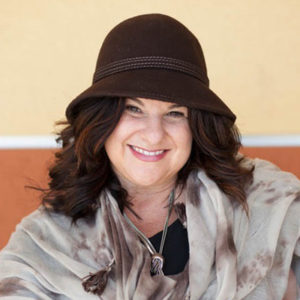“Where are you now?”
“Honestly? Laura said, I’m on the floor, staring at the ceiling. I’m convinced I will never have another original thought in my brain.
Laura was a highly sought-after creative professional with a fierce inner critic. As an advertising exec, she needed to come up with fresh ideas and often. Even though Laura had battled with her inner critic before and had been able to churn out stellar ideas, this time, she said, it just wore her down. Her inner critic was so loud that she barely wanted to get out of bed. She said the voice told her she was no longer good enough to make it. She noted, “It’s the same voice that tells me I’m too fat to go out on a date or too stupid to deserve a raise.”
We all have an inner critic, which can chime in with all kinds of upsetting messages. It’s that voice that says things like, “I can’t do this,” “Something is wrong with me,” or “I’m a terrible parent.” The inner critic lives in a primitive part of our brain, sometimes called our “survivor brain,” that is hyper-vigilant and always looking for threats. It once helped us when threats were literally around each corner. But today, it is the part of our brain that pits us against ourselves, judges us, and tells us we are not good enough. What was once, hey, don’t go in that cave or you may get eaten, is now telling us not to walk into our bosses’ office to ask for a raise because no way do we deserve it.
So, what’s the harm in having an internal voice that is a little critical? Maybe it’s keeping us humble? Maybe it even pushes us to achieve? Not so, says Golan Shahar, Ph.D., psychological researcher, and author of Erosion: The Psychopathology of Self Criticism, who has studied the nature of self-criticism for over two decades. Golan shares that the research across the United States, Europe, Israel, and Canada reveals that “self-criticism…contributes to depression, anxiety, eating disorders, substance use disorders, juvenile delinquency, physical health conditions, and even suicidality.”
As a therapist for artists and writers, I work daily with talented people who struggle with the voices in their heads that tell them their work is crap, uninspired, or that no one will care what they have to say. What I have found is that when you have listened to your inner critic for so long, you may actually believe it speaks the truth. It makes you feel inept, unable, or stuck, leading to feelings of worthlessness and anxiety. Some shut down new opportunities and avoid leaving a narrow comfort zones. The inner critic is a nasty beast that tries to convince us we are just no good, and we better play small.
The antidote is a deceptively simple concept. Self-compassion. When I share this concept with my its usually met with skepticism. I hear things like,
“Self-compassion sounds like some self-indulgent California thing.”
“It sounds like that would make me lazy.”
“Uhhh, why would I lie to myself if I’m a screw-up?”
Self-compassion is not new. Buddhism and much Eastern philosophy is steeped in the concept of self-compassion. The Buddha said, “You yourself, as much as anybody in the entire universe, deserve your love and affection.” Much of the Western psychological world woke up to this concept in 2003 when pioneering self-compassion researcher and author Kristin Neff, Ph.D., the first to operationally define and measure self-compassion, presented her findings.
First, Neff defined what a self-compassionate response might look like. She explains that self-compassion involves being aware of our pain and approaching ourselves in an understanding and non-judgmental way. Specifically, it involves three components.
1) Being kind to yourself. Offering yourself understanding rather than judgment.
2) Understanding suffering is part of our common humanity. When we suffer it helps to remember that all human beings feel pain and make mistakes
3) Practicing mindfulness. When suffering arises, try to observe your emotions without letting them overwhelm you.
Self-compassion works directly to soothe our survivor brain – remarkably calming and softening the overactive voice in our heads that tells us we are not enough. It can help you to feel more motivated and resilient. In Neff’s article, The Role of Self-Compassion in Development: A Healthier Way to Relate to Oneself she states that “Higher levels of self-compassion are linked to increased feelings happiness, optimism, curiosity and connectedness, as well as decreased anxiety, depression, rumination and fear of failure.”
So why is this simple tool so hard to use?
Research Psychologist Christina Chwyl of Drexel University, notes that it’s often hard for us to be self-compassionate because we may never have been taught to be kind to ourselves; we may have been raised with a lot of criticism, and our brain is hardwired to see the negative, to notice the threats so we can protect ourselves. Bottom line, it may not feel natural to be kind and understanding with yourself, especially at first. But self-compassion it turns out is an essential skill that is both healthy and smart. Working on yourself compassion system will make you feel better on a daily basis and will help you grow.
She notes, “Our research echoes what studies have found time and time again — self-compassion not only feels better than harsh self-criticism, but it works better too, helping us rise to life’s inevitable challenges.”
A Simple, Fun Self-Compassion Practice
In my work, I first focus on the first two ingredients in Neff’s recipe. Allowing your feelings without judging yourself and normalizing difficult emotions. A simple way to do this is when you hear that inner critic start to yammer on, simply place your hand over your heart and say to yourself, “I’m struggling right now. It’s okay for me to feel exactly how I’m feeling right now.” (allowing) and “I understand that I am feeling bad, it’s normal for humans to struggle with feelings like this.” (normalizing). With these two sentences, you can start to neutralize the inner critic’s power. You can top it off with a kindness offering to yourself, something like “I am a hard worker. I will figure out the solution.” Other ways to practice self-compassion are to
- Create an “allowing journal” where you let yourself write without judgment about what you are feeling
- getting into nature for five to ten minutes
- taking an emotional break even when you think you have no time, or
- offering yourself a moment of kindness to sip tea and appreciate your positive qualities
Need help making this a practice? The Self-Compassion Vision Board can help.
How to Make a Self-Compassion Vision Board
This is a fun, easy practice to start you on your self-compassion journey, and it requires no artistic talent. While other vision boards are used to envision the kind of future you want, the self-compassion vision board helps you keep a gentle daily focus on allowing, normalizing, and self-kindness.
What you will need:
Small posterboard or piece of paper
Markers, pens
Pictures or images of self, nature, anything healing
Decorative items that promote feelings of calm/soothing
If you are pressed for time, this can be done with a simple pen and a blank sheet of paper. But spending some time creating your self-compassion vision board is a healing activity. Why not give yourself an hour to create something that lovingly reminds you to care for yourself?
Decorate the collage however you want to; just make sure to leave a lot of white space in the middle so that you have plenty of room to fill in your self-compassion wins. Attach a pen to the board (with string or tape) and hang it up. At the end of the day, write down a self-compassion win – at least one thing you did for yourself that was kind, allowing or understanding.
What I have found in my practice is that a shift begins after using the board for a few days. Clients start to look for moments to allow their feelings or to be kind to themselves. Some clients made notes that said, “I soothed my nervous system by doing breathing exercises. “I told myself it was okay to feel sad. I acknowledged that I was struggling and needed a break. I let myself journal about my frustrations and didn’t judge myself for venting. After a tough meeting, I sat with my back against a tree and said, I respect you for facing that difficult client.
No matter your personality type, If you are achievement-oriented, run on nerves, have fear about taking risks you will like filling up the board to see all the ways they are being kind, allowing, and normalizing, knowing that you are strengthening a system within yourself that will make you healthier, happier, and more resilient.
By: Marni Freedman
 Marni Freedman (BFA, LMFT) is a produced, published, and award-winning writer. After graduating as an award-winning student from the USC School of Filmic Writing, Marni began her career with her play, “Two Goldsteins on Acid,” which was produced in Los Angeles. She worked as a script doctor for top film companies and worked as a script agent for the Mary Sue Seymour Agency. One of her plays was made into a film, “Playing Mona Lisa,” and was produced by Disney.
Marni Freedman (BFA, LMFT) is a produced, published, and award-winning writer. After graduating as an award-winning student from the USC School of Filmic Writing, Marni began her career with her play, “Two Goldsteins on Acid,” which was produced in Los Angeles. She worked as a script doctor for top film companies and worked as a script agent for the Mary Sue Seymour Agency. One of her plays was made into a film, “Playing Mona Lisa,” and was produced by Disney.
Marni is the co-founder and Programming Director for The San Diego Writers Festival, (www.sandiegowritersfestival.com) whose mission is to gather Southern California writers and creatives for a day of literary celebration, creative expression and most importantly, to promote diversity and inclusion for undeserved communities.
She runs the San Diego Writers Network and is the programming director for the San Diego Memoir Association (www.sdmwa.org) which produces a yearly theatrical Memoir Showcase. This year, Marni edited the Anthology, Shaking the Tree: brazen. short. memoir. which was published by MCM Publishing. Marni’s profound experience with her teachers at USC who were blacklisted, has shaped the direction of her life and career. Her play, A Jewish Joke about the Blacklist appeared Off Broadway in March of 2019 (www.ajewishjoke.com)
Marni is also a therapist for artists and writers. Her welcoming, easy-going nature and solid background are the underpinnings of what makes her such a popular writing coach across the country. Marni is a unique writing coach because she has a tool for almost everything. She has a way of taking complicated information and translating it into easy-to-grasp, step-by-step information. Her character worksheets and plotting devices have been met with rave reviews. She teaches writing workshops for UCSD Extension, conferences and retreats across the state and runs the Memoir Certificate Program at San Diego Writers Ink
Marni’s latest award-winning book, Permission to Roar: For Female Thought Leaders Ready to Write is an Amazon Bestseller. She lives with her wonderfully talkative husband and son and their two cats, Dorothy J. Witten and The Beef, who don’t like each other. Within her community she is often referred to as Glenda, the Good Witch of Writing.
Her first book on writing, 7 Essential Writing Tools: That Will Absolutely Make Your Writing Better (And Enliven the Soul) was recently published. Her next book, The Memoir Map, will be released in November 2017. You can also find Marni at thefeistywriter.com, a writing hub to help writers find and believe in their authentic voice.




